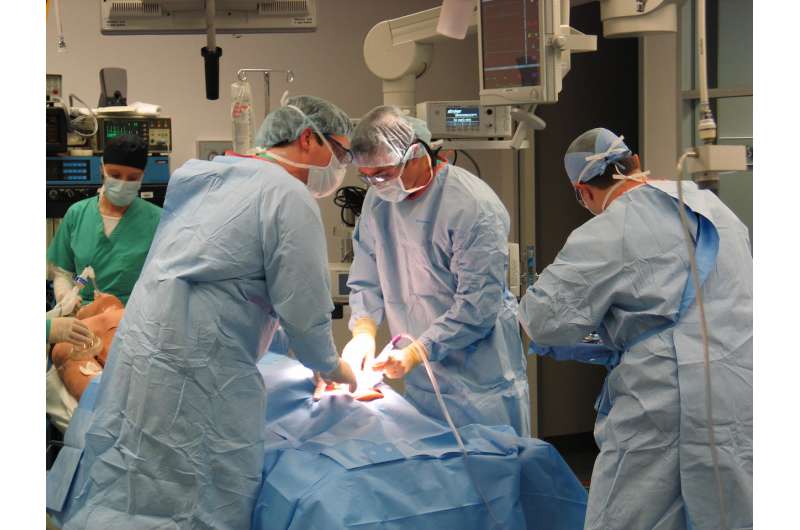Students in health enrichment programs benefit from early team-based exposure

A study conducted by LSU Health New Orleans researchers provides new evidence that early exposure to multiple health disciplines in pipeline programs targeting underserved/underrepresented students interested in health professions reduces the development of traditional role and leadership stereotypes about professional health care teams and practice. Programs that include interprofessional health exposure will ultimately improve collaboration resulting in better patient outcomes. The findings are reported in Health and Interprofessional Practice published October 18, 2018.
The LSU Health New Orleans research team led by Tina Gunaldo, Ph.D., DPT, Director of LSU Health New Orleans' Center for Interprofessional (IPE) Education and Collaborative Practice, examined pre and post-survey responses of students participating in the 2017 Summer Health Professions Education Program at LSU Health New Orleans. LSU Health New Orleans is one of 13 sites offering the free, six-week academic enrichment program designed for college freshmen or sophomores interested in pursuing healthcare careers. It is funded by the Robert Wood Johnson Foundation, in association with the Association of American Medical Colleges and the American Dental Education Association. At LSU Health New Orleans, the program is a partnership of its schools of medicine, dentistry and public health with support from its Center for Interprofessional Education & Collaborative Practice. The program helps develop critical thinking and reasoning skills and provides academic enrichment in selected gateway undergraduate basic science and quantitative courses, such as Organic Chemistry, Physics, Anatomy & Physiology, Microbiology, and the Introduction to Biostatistics & Epidemiology, along with public health and health policy. The program also provides professionalism skills and knowledge development in areas of cultural competency, health equity, professional careers financial planning, as well as social determinants of health, medical ethics, and patient quality initiatives. The students also gain some clinical experience.
Participants in 2017 also took part in small IPE group activities and IPE sessions, completed an online module created by the National Center for Interprofessional Practice and Education, and met faculty from various health disciplines at LSU Health New Orleans to learn about the educational and training requirements of their fields.
Fifty-three students who completed the surveys for the study demonstrated statistically significant positive changes in IPE perceptions. Additionally, student perceived knowledge of the scope of practice of dental providers, physician providers and public health professionals also improved.
The World Health Organization defines interprofessional education as occurring "when students from two or more professions learn about, from, and with each other to enable effective collaboration and improve health outcomes. Once students understand how to work interprofessionally, they are ready to enter the workplace as a member of the collaborative practice team. This is a key step in moving health systems from fragmentation to a position of strength."
LSU Health New Orleans is the most comprehensive professional health university in Louisiana and the only one is the state with a centralized IPE office. It developed and integrated the two-year Team Up interprofessional education experience into the curricula of all six LSU Health New Orleans schools for first and second-year students. Not many universities in the country and no others in the state match LSU Health New Orleans' preparation of future health professionals for team-based health care.
"Research is emerging on the positive impact of interprofessional education," notes Dr. Gunaldo, "however there has not been much in the literature about the best time to incorporate it. We found that inclusion of IPE in an academic enrichment program exposes pre-health professional students to the importance of collaboration and influences typical negative stereotypes that exist before admission into a health professional program. Such early exposure has the potential to improve the development of professional health care teams."
More information: Tina P. Gunaldo et al, Integrating Interprofessional Education into an Academic Enrichment Program, Health and Interprofessional Practice (2018). DOI: 10.7710/2159-1253.1168


















